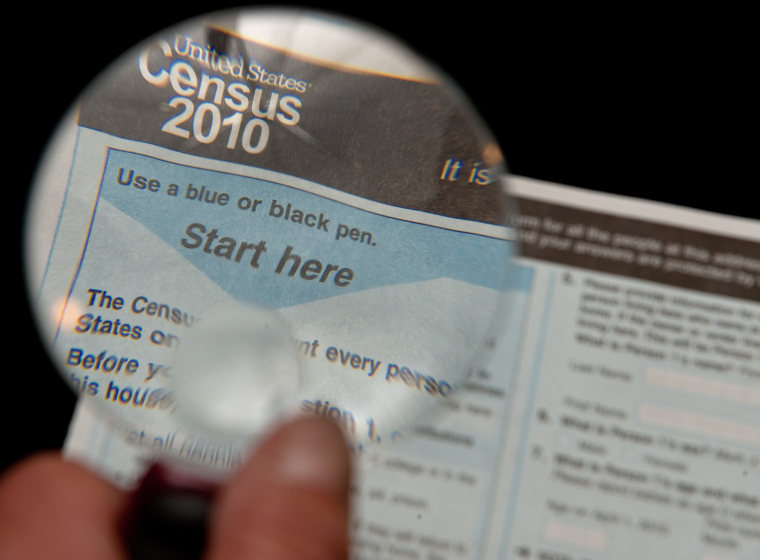For con artists and swindlers the 2010 Census is a golden opportunity for mischief. With forms going out to every household in the country, the pool of potential victims is huge.
So far, there are no reports of any significant census fraud taking place. But based on 25 years of consumer reporting, I can guarantee you it’s going to happen.
The biggest threat is identity theft. Paul Stephens with the Privacy Rights Clearinghouse in San Diego says there are four main ways you can be tricked into giving up your personal financial information.
“You could receive an e-mail that is fraudulent. You could receive a phone call that’s fraudulent. You could even receive a fraudulent census form in the mail. And, of course, you could be visited by an imposter claiming to be a census worker,” Stephens explains.
Here’s what to watch out for:
Fraudulent e-mail
The Census Bureau will not send out any electronic correspondence dealing with the 2010 census. Any e-mail claiming to be related to the current census is bogus, most likely a phishing scam designed to steal personal financial information.
Rod Rasmussen with the Anti-Phishing Working Group tells me they fully expect some sort of online attack.
“It's the first time we've had a census since malware went commercial,” he says, “and the opportunities are just too rich – especially for the scammers who are really good at ‘topical’ social engineering.” By that he means hackers who base their attacks on current events.
Before you delete any fraudulent e-mail, forward it to the Census Bureau at so it can be investigated.
Bogus phone calls
Census workers do make phone calls. In fact, one of the questions on the census form asks for your telephone number in case there’s a problem with your responses. A legitimate census employee will only ask about the 10 questions on the census form.
If you are uncertain about the caller, contact the regional census center in your area.
Fake survey forms
Paul Stephens says it's possible the bad guys could send out their own survey forms made to look like the real thing. You can see what a real census form looks like at census2010.gov. Everyone gets the same form with ten simple questions.
The Census Bureau will never ask about account numbers or other sensitive information.
"If you receive something in the mail supposedly from the Census Bureau and it asks you questions such as financial information, passwords, Social Security numbers, anything like that — it is not legitimate,” Stephens says. Disregard it and report it to the United States Postal Inspection Service.
Imposter census takers
What if someone knocks on your door? While some census workers have been going out to update addresses and leave forms, they will not make home visits to ask for responses to the census form until May 1. And then they will only go to homes where the census form has not been returned.
A real census taker has an ID badge. There’s a watermark of the Department of Commerce insignia on the front and their name and an expiration date on the back. They should also have a flier that tells you how to contact their supervisor. The people going door-to-door may have a bag and a handheld or notebook computer. Each of these items will have the Census Bureau insignia on it.
“Our people are trained to conduct their interview on your doorstep and not go into the house,” says Census Bureau spokesman Michael Cook. “They are also trained not to push. They are happy to make an appointment to come back.”
Census takers only ask for answers to the same 10 questions that are on the census form. If you are asked anything that seems inappropriate, such as Social Security numbers or financial information, you’re probably talking to an imposter. Tell them to leave and contact your local police department.
If there’s any doubt, check them out first by calling your regional census office.
Confusion about another census survey
I’m hearing from people who are getting what’s called the “American Community Survey” in the mail. They’re afraid it’s a scam. It’s not. The American Community Survey (ACS) is a yearly survey done by the Census Bureau that provides the government with more current data in-between the every-ten-year Census.
ACS forms are sent to about 1 in every 480 households. This survey asks very detailed and personal questions such as employment status, yearly income, mortgage payments and property taxes. It takes about 40 minutes to complete.
The data collected is used by state and local governments to plan and fund such things as school construction, transportation systems, public housing, police and fire precincts and future utility needs.
Some people find the questions intrusive. But just like the decennial census, you are required by law to respond. If you don’t, expect to be contacted by a census taker.
We all need to be counted
None of this is meant to discourage you from filling out your census form. In fact, I encourage you to fill it out and mail it back as soon as possible. I sent mine in this week.
It’s important that we are all counted because this information has both financial and political ramifications. Census data is used to figure out how much federal money comes into your community. The number of seats allotted to each state in the House of Representatives is based on population figures determined by the census.
Here’s something else to consider — it costs a small fortune to collect this information from people who don’t mail back the census form.
“The greater the response, the greater the savings,” Cook says.
According to a Pew Research Center survey released last week, a majority of Americans (70 percent) say they will return the form. Cook says taxpayers will save $85 million for every 1% the Census Bureau can increase the mail response rate.
More information
